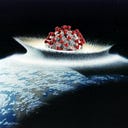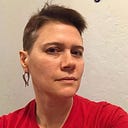We Hate You Now
The Hardest Problem of The Aftertimes
I finally lost it when someone asked me about the new variants. Friends and acquaintances who relied over the last year on my research and knowledge asked me what it meant, and how dangerous it was, to have these new more transmissible and/or deadly strains circulating just when we’d hoped the vaccines would soon end the pandemic. “It means nothing,” I told them, “Everything will be fine, because masks, social distance, hand washing, and common sense still work just as well against these versions of the virus.”
Of course, the variants do mean something. Variants are just what happens when there’s enough mutations to make a difference in the disease. Mutations happen every time someone catches Covid-19. Variants happen when so many people have caught the disease that it’s evolving to act differently inside the body. This virus has had so many bodies to mutate through that it has evolved several new ways of attacking cells and evading the immune system. In other words, so many people got infected that the virus got better at attacking us.
That’s why variants finally cracked me, because that’s what humanity let happen over the last year. But mutations don’t make it any better at being a virus: it still falls apart in alcohol and soap, and with time. It still can’t power through a mask. So all you have to do, I told friends, and am telling you now, is all the things you were supposed to be doing for the last year.
If people were doing those things, we’d be fine.
But we’re not fine, are we?
I am not fine. I am vibrating with anger these days, and while for me it was the variants, for others it was the number of cases or the deaths or relentless pace and incoherent rule changes over most of the world. Like many people, I knew masking and distance and hand washing worked by last March, and before we knew fomite transmission wasn’t much of an issue, I wiped down everything that came in the house. We knew ventilation was important. We knew getting out of the house to exercise was important. I would walk my teenage daughter to see friends, masked, from more than six feet away to fight the loneliness and teenage isolation the pandemic caused while preventing transmission and death by Covid-19. I did everything I could to help her with remote education, but it was still stupefying and confusing. She’s finishing High School without ever seeing a teacher in person, without hugging a single friend in a year. When myself or my family have had to travel, and we really have had to, we wear (home) fit-tested masks and eye protection. We don’t eat or drink with anyone outside our house. We hand sanitize every time we go in or out of any place, touch anything, put on or take off a mask. It’s difficult and unpleasant, but it’s safe, not just for us, but for anyone around us.
I’ve watched friends who work in medicine struggle with exhaustion. I’ve heard the same stories you’ve heard: of medical staff burning out, getting Covid-19, some quitting, some dying of the disease, some committing suicide under the pressure. And it goes on in relentless ups and downs, despite the fact that we’ve known for a year now how to stop it. Despite the fact that in places like Vietnam, New Zealand, Bhutan, and Taiwan, they did stop it, because they did the things we all knew worked a year ago.
Do the new variants matter? They shouldn’t matter, they wouldn’t matter, they wouldn’t even exist, if folks had actually done the right thing. But instead, we’re nearing 120,000,000 confirmed cases, mostly because folks didn’t do the right thing.
After a year of care and patience and sacrifice in my family, with cases still going on relentlessly around the world, I personally have lost it with you people. I don’t think I’m alone. I’m pretty sure everyone else who just spent a year at home, or only going to an essential job while doing everything they could to prevent transmission have also lost it with you people. We may not know who you are, we may never know, but we hate you now. You did this to us.
This isn’t my first pandemic, I grew up in the age of AIDS in a deeply impacted community. I buried a lot of people back then, and eventually did a lot of safer sex education and learned a lot about how you fight a disease as a community member, not a clinician or a researcher. I learned the valuable lesson that shame is not a strategy. There are moments, interpersonal moments, where shame is absolutely a tactic, but it is never a political strategy. So I want to assure you what I’m talking about isn’t about shaming people.
This is about the consequences of human actions. This is about pure rage, caged up in millions of houses. It isn’t surprise, from the beginning I thought January and February was when the pandemic would peak if the world didn’t work to stop transmission. But I did not predict how I would feel about it. I got my hints in early summer, when a friend posted pictures from a weekend vacation in another country, hanging out with friends on a boat, and complained about not getting to go to clubs. I was done. I won’t be speaking to that person again. If I am ever in a shared physical space with that person, there is a good chance I will ignore their existence, because the alternative behavior is much worse. There are a lot of people in the same position I’m in. We’re the people who gave up a year (so far) to keep ourselves, our families, and our societies safe. And then there’s those of you who didn’t.
There’s going to be a point where this is over, and we’re all going to be in person again. If you didn’t mask, went to crowded spaces, visited friends and family, any of those things, best hide that from me. Because what’s happening right now is your fault: the sickness, exhaustion, deaths, loneliness, isolation, it’s the fault of people who can’t just stay home and mask long enough to let this horrible thing burn itself out. I’m not talking about the people who have to keep working to keep us fed and safe and communicating, the people who have had to keep society working through all this. It’s the people who want to have a drink, to dance and party and eat out, go to church in person, fly around the world and skip out on quarantine, and of course, just not wear a goddamned mask. It’s the risky behavior that you didn’t have to do, which you knew was risky because you can read, and you did anyway, because your short-term happiness was more important than the whole damn world. Literally, the whole damn world.
I finally lost it when someone asked about the variants, but I was always destined to lose it. I count in my family and community essential workers, some over 65, who just had to keep going through this all. I spent so many nights terrified for them. This has always been personal for me, just as it is personal for the hundreds of millions, maybe billions, of lives who have been touch, mauled, or destroyed by this disease and by the people who enabled it.
At some point we’re all going to be back in the world together, but it’s never going to be the same.
Right now, I don’t have a clue how to begin to forgive the people who have driven the world to the edge. I can blame politicians a bit, which is always nice. They are abstract and easy to blame, but they don’t shed most of the virus. Plenty of countries, democratic, autocratic, eastern, western, big and small, opted out of the pandemic. They said no, their people said no, and they just didn’t have to live through the hell of the last year the same way my family and my community have lived through the US and European experience of Covid-19. Friends in New Zealand are almost apologetic when I talk to them. Vietnam, more populous than any country in Europe, has had 35 deaths from the virus at the time of this writing. They did amazing hand washing Tiktoks early, got together on the idea of prevention and masking, and just skipped the endless grind of living in an endless surge of misery and death.
When all the people who worked and sacrificed to slow Covid-19 down encounter all the people who didn’t, it’s going to be a new and vicious split in society, and it’s going to take a generation to heal.
Unlike any other pandemic in history, our level of scientific knowledge and ability to communicate globally gave us the power to stop this virus. This is humanity’s first self-inflicted pandemic. Or rather, a bunch of people inflicted it on the rest of us because of selfishness, ignorance, or both. If you are one of those people, you have by definition not had to deal with me or my tribe — the ones that took this seriously, the ones who fought this thing tooth and nail, or who stayed home except to do the most needful things. But when we are all back together, this is going to be a new and terrible social problem. If you were out, helping to spread this virus, I don’t know what to tell you. It’s going to be a long time before I know how to forgive you.
You should probably just lie about it for the rest of your life.
Thanks to Ryan Singel, and thanks to my patreons for making my writing possible. (But don’t blame them if you’re angry, that’s all me)

